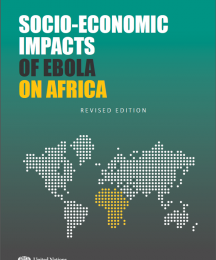
Title
The report raises the alarm on the risk of a rise in mortality of diseases not related to Ebola and also points out the wider impacts of the virus on the livelihoods of those affected. Educational systems, rising social stigma, unemployment, and decreased food security are some of the big issues that Ebola-affected countries must deal with, according to the report.
Despite the alarm, Carlos Lopes calls for a careful and cautious approach to the response. The Executive Secretary of the Economic Commission for Africa notes that while the social and economic situation in the three most affected countries is dramatic, the crisis for Africa as a Continent is exaggerated.
According to the report, West Africa has been the fastest growing region in Africa in recent years. Based on 2013's estimates, the three Ebola countries taken together only represent 2.42 percent of West Africa's GDP and 0.68 percent of Africa's GDP, so West Africa's overall growth should remain robust.